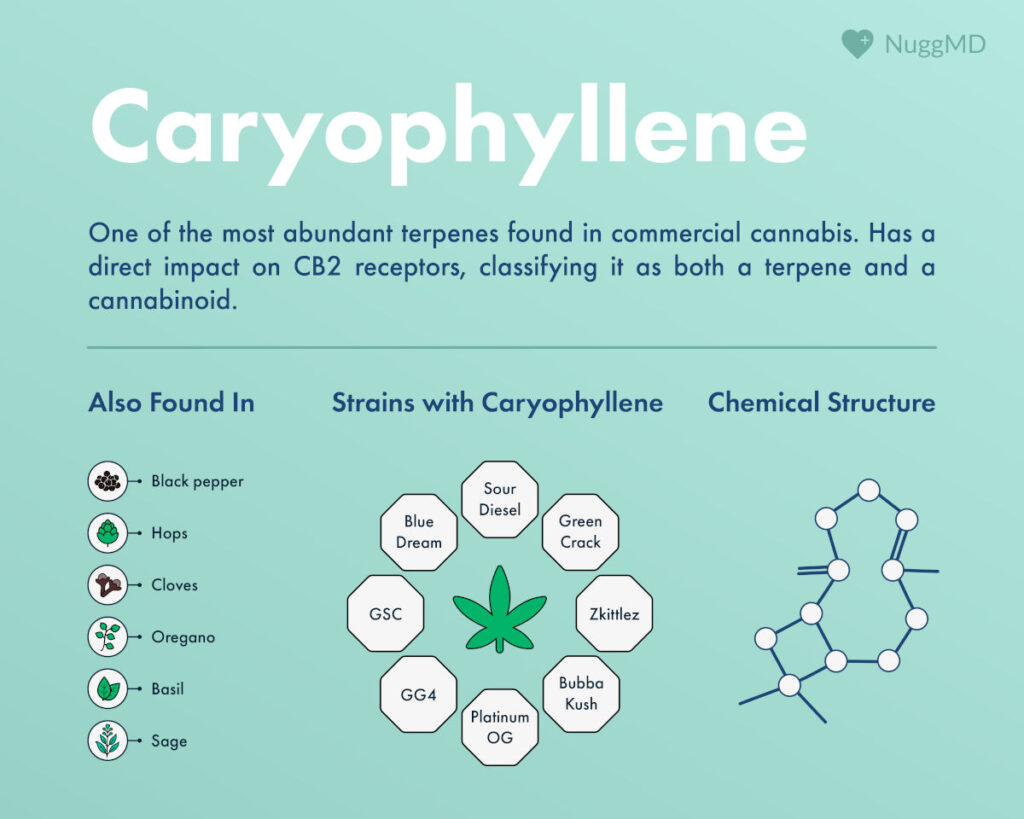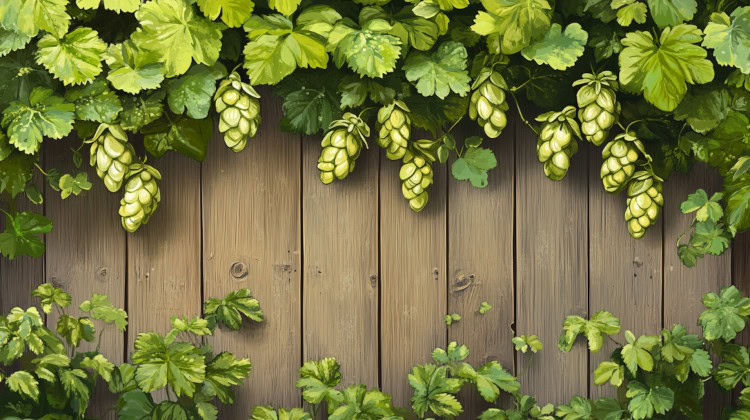In This Article
- Potential Benefits of the Caryophyllene Terpene: What Does it Do?
- Pain and Inflammation
- Anxiety and Depression
- Brain and Nerve Health
- Antimicrobial and Antioxidant
- Does It Make You Sleepy?
- How Does Caryophyllene Work?
- What Does the Terpene Smell Like?
- Other Plants High in Caryophyllene
- Top Caryophyllene-Rich Strains
- Sour Diesel
- Green Crack
- Zkittlez
- Bubba Kush
- Platinum OG
- GG4
- Girl Scout Cookies (GSC)
- Blue Dream
- References
Key Takeaways
- The caryophyllene terpene may have benefits for pain and inflammation, nerve health, and mental health conditions.
- Black pepper, cloves, cinnamon, and hops are all also high in caryophyllene.
- Sour Diesel, Green Crack, and Bubba Kush are top strains for caryophyllene.
Cannabis flower with a bold, peppery scent is likely rich in the terpene caryophyllene. This spicy, earthy terpene creates the sharp, nose-tingling aroma of strains like GG4, Bubba Kush, and Sour Diesel. Caryophyllene offers more than flavor. It plays a unique role in how cannabis interacts with the body.
Unlike other terpenes, caryophyllene directly engages with the body’s endocannabinoid system (ECS). Instead of just influencing scent and taste, it binds to CB2 receptors. This may help reduce inflammation, relieve stress, and ease pain.1 Such a unique ability sets caryophyllene apart from other terpenes, making it a standout in cannabis.
Potential Benefits of the Caryophyllene Terpene: What Does it Do?

Caryophyllene does more than just add a spicy scent to cannabis. It’s the only terpene directly interacting with the body’s endocannabinoid system (ECS). Because of this, researchers believe it may play a role in pain relief, stress reduction, brain health, and more.
Pain and Inflammation
Caryophyllene binds to CB2 receptors linked to inflammation and pain control. This makes it a popular terpene for people seeking natural relief from aches and soreness.
Some research suggests cannabis may work as well as opioids for certain types of pain.2 Scientists have also explored caryophyllene’s role in reducing pain sensitivity. This may be especially relevant for conditions like arthritis and migraines.
Anxiety and Depression
Caryophyllene may also support mental health. It interacts with CB2 receptors, which affect stress and mood regulation.
Research has found that caryophyllene may have antidepressant effects by activating CB2 receptors.3 Another study suggests that it may reduce stress and promote relaxation.4
Brain and Nerve Health
Scientists are also studying whether caryophyllene can help protect the brain and nervous system. Early research suggests it may be neuroprotective, supporting brain function and reducing inflammation in the nervous system.3
Likewise, studies continue to explore caryophyllene’s potential in epilepsy treatment and how it may reduce seizure frequency. Other research suggests caryophyllene may support cognitive function and help protect brain cells from damage.3
More research is needed, but these findings suggest that caryophyllene may be useful for long-term brain health.
Antimicrobial and Antioxidant
Caryophyllene is found in several other types of plants used in traditional medicine. Further research suggests that the terpene may have antibacterial and antifungal properties.1
It may also work as an antioxidant, helping to reduce cell damage and fight inflammation.1 Scientists are still studying how this applies to human health.
Does It Make You Sleepy?
Caryophyllene isn’t usually sedating, but its effects depend on the strain and combination of other cannabinoids and terpenes. Some caryophyllene-rich strains feel relaxing and stress-relieving but don’t cause drowsiness. Others might be more calming and sleep-inducing, especially those with high myrcene levels.
On its own, caryophyllene won’t make you sleepy like melatonin or sedative strains.
If you're looking for cannabis strains to help with sleep, consider ones that contain caryophyllene alongside myrcene or linalool. These are more commonly linked to sedative effects.
How Does Caryophyllene Work?

THC binds to CB1 receptors, causing intoxication. Meanwhile, caryophyllene only binds to CB2 receptors and is non-intoxicating. CB2 receptors are linked to pain relief and immune function. This means caryophyllene may help with discomfort and inflammation without affecting clear-headedness.1
It may also play a role in the entourage effect, where different cannabis compounds may help influence the effects of a cannabis product, dependent on the cannabinoid, terpene, and potentially flavorant blend.
What Does the Terpene Smell Like?
Caryophyllene has a woody scent. It gives certain cannabis strains a sharp, almost nose-tingling aroma, adding depth to their profile. Because of its strong, woody notes, caryophyllene is easy to recognize in strains with earthy or woody aromas.
Other Plants High in Caryophyllene

Caryophyllene is also present in many common plants and spices worldwide.5 If you’ve ever smelled black pepper, cloves, or cinnamon, you've encountered this terpene.
Some of the best-known sources of caryophyllene include:
- Black pepper – One of the richest sources, giving it its signature spicy bite.
- Cloves (Syzygium aromaticum) – Used in many baked goods, hot drinks, and curries.
- Cinnamon – Adds warmth and depth to both foods and fragrances.
- Oregano – Gives Mediterranean dishes their bold, earthy flavor.
- Hops – A key ingredient in beer, adding spice and complexity.
- Lemon balm – Known for its calming properties and mild citrus scent.
Because caryophyllene acts as a phytocannabinoid, it may contribute to some of these plants' natural therapeutic effects.6 Researchers continue studying its role in pain relief, inflammation, and cancer treatment.
Top Caryophyllene-Rich Strains

Strains high in caryophyllene often have bold, spicy, or earthy flavors. They may offer relaxing, mood-boosting, or pain-relieving effects. If you’re looking for cannabis varieties rich in this terpene, below are some of the best-known examples.
Sour Diesel
Sour Diesel is famous for its sharp, fuel-like aroma and energizing effects. This strain delivers a fast-hitting cerebral high, often described as euphoric and uplifting. Caryophyllene, limonene, and myrcene give it its bold, peppery flavor with citrusy undertones. Consumers might turn to this strain for stress relief, mood support, and motivation.
Green Crack
Despite its intense name, Green Crack is a stimulating strain known for its peppery, citrus-forward aroma. Caryophyllene helps enhance its spicy, earthy flavor, while limonene and pinene contribute to its clear-headed, energetic high. Consumers may choose Green Crack for daytime use, focus, and creative bursts.
Zkittlez
Thanks to its high caryophyllene content, Zkittlez is a sweet and fruity hybrid with hints of spice and earthiness. Unlike other caryophyllene-rich strains, it's known for its deeply relaxing, full-body effects. Cannabis consumers might choose this strain for winding down, stress relief, and mild euphoria.
Bubba Kush
Bubba Kush is a heavy-hitting variety with a spicy, coffee-like aroma and earthy undertones. Its high caryophyllene and myrcene levels contribute to its calming sedative effects. Some enjoy it for unwinding, relieving muscle tension, or supporting sleep. Others prefer it for evening use or pain relief.
Platinum OG
Platinum OG is a powerful cultivar with a rich, spicy herbal aroma and a smooth, woody finish. Caryophyllene plays a big role in its bold scent and body-heavy effects. Some may enjoy it for deep relaxation, stress relief, and full-body comfort.
GG4
GG4, also known as Gorilla Glue #4, is a potent cultivar known for its sticky resin and strong presence. This strain’s peppery, earthy scent comes from high levels of caryophyllene, contributing to its relaxing yet mentally uplifting effects. Many consumers use GG4 for pain relief, relaxation, and creative focus.
Girl Scout Cookies (GSC)
GSC is said to be a well-balanced cultivar that blends sweet, spicy, and earthy flavors. Caryophyllene gives this strain its subtle peppery kick, while limonene and humulene round out its complex aroma. It's popular for euphoria, relaxation, and stress relief without full sedation.
Blue Dream
Blue Dream is reported as a smooth and uplifting cultivar with earthy, herbal flavors and hints of berry sweetness. While its caryophyllene content adds depth to its aroma, its mix of myrcene and pinene contributes to its gentle, creative bliss. Blue Dream is often recommended for balanced relaxation, mental clarity, and mild pain relief.
References
- Cavalli J, Dutra RC. A closer look at cannabimimetic terpenes, polyphenols, and flavonoids: a promising road forward. Neural Regen Res. 2021;16(7):1433-1435. doi:10.4103/1673-5374.301011 ↩︎
- Arnett, A. New Survey Suggests Medical Cannabis as Effective as Opiates for Neuropathic Pain. NuggMD. Published August 22, 2023. ↩︎
- Francomano F, Caruso A, Barbarossa A, Fazio A, La Torre C, Ceramella J, Mallamaci R, Saturnino C, Iacopetta D, Sinicropi MS. β-Caryophyllene: A Sesquiterpene with Countless Biological Properties. Applied Sciences. 2019; 9(24):5420. https://doi.org/10.3390/app9245420 ↩︎
- Sommano SR, Chittasupho C, Ruksiriwanich W, Jantrawut P. The Cannabis Terpenes. Molecules. 2020;25(24):5792. Published 2020 Dec 8. doi:10.3390/molecules25245792 ↩︎
- Fidyt K, Fiedorowicz A, Strządała L, Szumny A. β-caryophyllene andβ-caryophyllene oxide-natural compounds of anticancer and analgesic properties. Cancer Medicine. 2016;5(10):3007-3017. doi:https://doi.org/10.1002/cam4.816 ↩︎
- Aly E, Khajah MA, Masocha W. β-Caryophyllene, a CB2-Receptor-Selective Phytocannabinoid, Suppresses Mechanical Allodynia in a Mouse Model of Antiretroviral-Induced Neuropathic Pain. Molecules. 2019;25(1):106. Published 2019 Dec 27. doi:10.3390/molecules25010106 ↩︎
The information in this article and any included images or charts are for educational purposes only. This information is neither a substitute for, nor does it replace, professional legal advice or medical advice, diagnosis, or treatment. If you have any concerns or questions about laws, regulations, or your health, you should always consult with an attorney, physician or other licensed professional.




